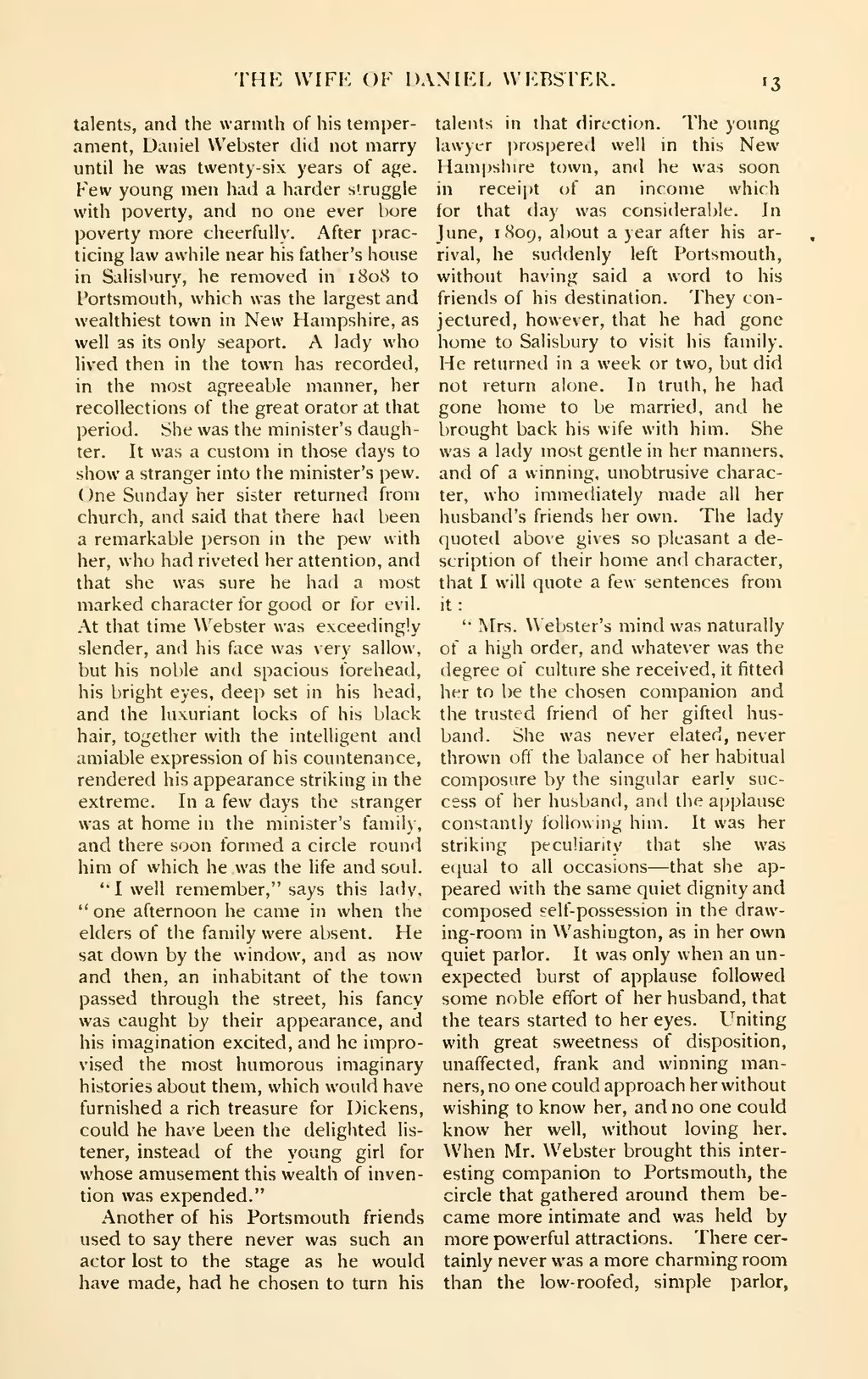THE wiff: ok 1)AN[F:L wkbster.
��13
��talents, and the warmth of his temper- ament, Daniel Webster did not marry until he was twenty-six years of age. Few young men had a harder struggle with poverty, and no one ever bore poverty more cheerfully. After prac- ticing law awhile near his father's house in Salisbury, he removed in 1808 to Portsmouth, which was the largest and wealthiest town in New Hampshire, as well as its only seaport. A lady who lived then in the town has recorded, in the most agreeable manner, her recollections of the great orator at that period. She was the minister's daugh- ter. It was a custom in those days to show a stranger into the minister's pew. One Sunday her sister returned from church, and said that there had been a remarkable person in the pew with her, who had riveted her attention, and that she was sure he had a most marked character tor good or for evil. At that time Webster was exceedingly slender, and his face was very sallow, but his noble and spacious tbrehead, his bright eyes, deep set in his head, and the luxuriant locks of his black hair, together with the intelligent and amiable expression of his countenance, rendered his appearance striking in the extreme. In a few days the stranger was at home in the minister's famil)', and there soon formed a circle round him of which he .was the life and soul.
T well remember," says this ladv. "one afternoon he came in when the elders of the family were absent. He sat down by the window, and as now and then, an inhabitant of the town passed through the street, his fancy was caught by their appearance, and his imagination excited, and he impro- vised the most humorous imaginary histories about them, which would have furnished a rich treasure for Dickens, could he have been the delighted lis- tener, instead of the young girl for whose amusement this wealth of inven- tion was expended."
Another of his Portsmouth friends used to say there never was such an actor lost to the stage as he would have made, had he chosen to turn his
��talents in that direction. The young lawyer pr()si)ered well in this New Hampshire town, and he was soon in receijjt of an income which for that day was considerable. In June, 1809, about a year after his ar- rival, he suddenly left Portsmouth, without having said a word to his friends of his destination. They con- jectured, however, that he had gone home to Salisbury to visit his family. He returned in a week or two, but did not return alone. In truth, he had gone home to be married, and he brought back his wife with him. She was a lady most gentle in her manners, and of a winning, unobtrusive charac- ter, who immediately made all her husband's friends her own. The lady quoted above gives so pleasant a de- scription of their home and character, that I will quote a few sentences from it :
" Mrs. Webster's mind was naturally of a high order, and whatever was the degree of culture she received, it fitted her to be the chosen companion and the trusted friend of her gifted hus- band. She was never elated, never thrown off the balance of her habitual composure by the singular early suc- cess of her husband, and the a];)plause constantly following him. It was her striking peculiarity that she was equal to all occasions — that she ap- peared with the same quiet dignity and composed self-possession in the draw- ing-room in Washington, as in her own quiet parlor. It was only when an un- expected burst of applause followed some noble effort of her husband, that the tears started to her eyes. Uniting with great sweetness of disposition, unaffected, frank and winning man- ners, no one could approach her without wishing to know her, and no one could know her well, without loving her. WHien Mr. Webster brought this inter- esting companion to Portsmouth, the circle that gathered around them be- came more intimate and was held by more powerful attractions. There cer- tainly never was a more charming room than the low-roofed, simple ]:)arlor,
�� �
